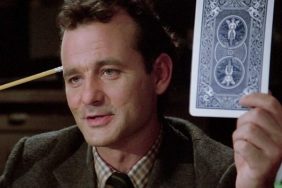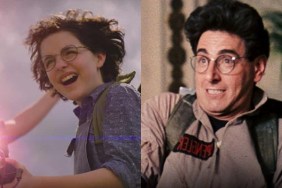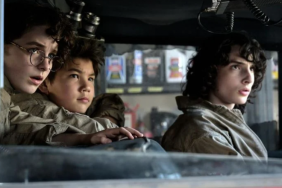Update: It now appears that the problem may have been with Deadline’s reporting, and not Sony’s plan for the Ghostbusters franchise. Devin Faraci at Badass Digest did some digging and discovered that no one at Sony (that he talked to, at least) knows where the heck the “guy centric” terminology came from in Deadline’s announcement about the expanding Ghostbusters universe.
According to BD, there is indeed another film in the works, the Russo Brothers are behind it, and Channing Tatum (and perhaps Chris Pratt) might co-star. But the plan is for the two franchises to take place in the same universe and cross over in a future film, followed by a possible prequel. Working together, not operating separately. Most importantly, the second film wouldn’t be working overtime to reorient the franchise around a masculine tone, undermining Paul Feig’s efforts.
If Sony does indeed plan to expand on Paul Feig’s Ghostbusters and use it as a launching pad for more stories, integrating it wholly into all future iterations, then this is less of a concern (unless the movie turns out to be terrible, obviously).
But industry analysts will still be looking closely at how much money two films with the same premise, starring different genders will make, especially in comparison to each other. Sony has put itself in a position to diminish the value of Feig’s half of the franchise if the Russo Brothers’ film makes more money. And that would still have a negative effect on the position of women as lead actors in mainstream genre films, sabotaging all the work Sony tried to put into this.
So there may be still be a potential problem on all of our hands, which I elaborate on more fully below. The context has changed, but the concern at least partially remains.
The Original Post Reads As Follows:
It was supposed to be good news.
Sony announced today the expansion of their Ghostbusters movie franchise. In an article at Deadline they revealed that The Russo Brothers (Captain America: The Winter Soldier) were lining up another film in the hit sci-fi/fantasy franchise, to be written by Drew Pearce (Iron Man 3) and possibly starring Channing Tatum (Gambit), who is also on board to produce. The studio also introduced Ghostcorps, a production company led by original Ghostbusters filmmakers Ivan Reitman and Dan Aykroyd. It’s an article full of boastful back-patting about returning to Aykroyd’s original vision for the franchise, and how the acting talent behind these new movies won’t have nearly as much approval over how they turn out.
That last part may be a little “iffy,” but that’s not the problem with the news of this expanded Ghostbusters cinematic universe. The problem is that, just months after announcing that the first new film in the franchise would feature an all-female cast – a revolutionary idea, particularly in the case of reboots, and a vote of confidence in the increasingly significant market for female-driven genre films – this second film will go back to being “a male-driven action-comedy” (Deadline’s words, not directly attributed to Sony).
Yes, you are allowed to be pissed off. And if you don’t know why you should be pissed off, then read on.

Related: Meet the All-Female Cast of the ‘Ghostbusters’ Reboot
An argument could be made that there’s nothing wrong with producing a male-centric Ghostbusters movie, since after all, we’ve already had two of them. And if Sony had announced this version first, and a female-centric spin-off second, it probably wouldn’t have raised too many hackles and Sony might have actually avoided all the backlash currently spewing out of social media.
But that’s not what happened, and so it is incredibly difficult to look at this series of events as anything other than cause and effect, i.e. that the announcement of a female-centric Ghostbusters movie led to a backlash amongst many purported fans of the franchise, leading Sony to lose confidence over the direction of said franchise and then immediately green light a male-centric version to appease them.
“Don’t worry,” Sony seems to be saying. “We were never going to commit to an all-female cast!”
And yet we don’t know that that’s exactly what happened. In fact, it’s entirely possible that Sony Pictures never thought for one second about how this would look to the legions of Ghostbusters fans who thought the studio was actually taking a stand against the marginalization of women in genre filmmaking. But the definition of “intelligent” has never included the words “failing to think things through.”

At the very best, Sony Pictures has clearly decided to hedge their bets. They are not committing to an entire female-centric franchise, because they don’t think it will make as much money. Let’s be honest: if the decision-makers at Sony thought it would make them money, they would have done it. They are running a business, first and foremost. That is their job. If they didn’t make decisions based on what they thought would make money, they wouldn’t have their jobs for long.
And in so doing, they have created an enormous opportunity to squander the enormous opportunity that they themselves created for this industry, by casting an all-female Ghostbusters reboot in the first place. If Paul Feig’s Ghostbusters movie makes less money than the male-centric version, or even roughly the same amount, it will only tell the entertainment industry that there is no need for change. No need to rethink their casting or hiring practices, and no need to seek out new audiences either. The status quo could remain unchanged because there might be no tangible evidence that changing it will benefit the bottom line.
Whereas if the female-centric Ghostbusters reboot had been allowed to be released on its own, without the promise of something to compare it to, the industry would have been required to take notice if it were any kind of success. Now, the industry has no reason not to wait to see how the second part of this experiment will unfold. If change ever comes, it will likely be a much slower process because of this announcement.
Slower, that is, than it already has been. The industry was only just starting to open its doors, and now one of the most inviting gatekeepers appears to be having second thoughts. It would be foolish to pretend that the other gatekeepers, many of whom didn’t appear all that eager to change in the first place, aren’t paying attention to this news.
Sony didn’t stab women in the back, but they also haven’t agreed to put down the knife. The threat looms large, and now it’s coming from the very people who – for a few months at least – actually promised to help put a stop to it.
William Bibbiani is the editor of CraveOnline’s Film Channel and the host of The B-Movies Podcast and The Blue Movies Podcast. Follow him on Twitter at @WilliamBibbiani.








